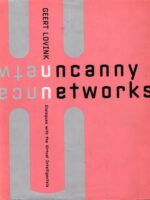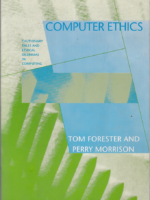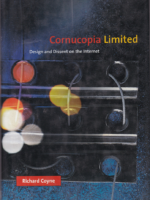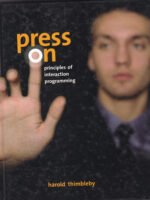-
Selfish Routing and the Price of Anarchy
₹1,550.00Roughgarden begins with a relatively nontechnical introduction to selfish routing, describing two important examples that motivate the problems that follow. The first, Pigou’s Example, demonstrates that selfish behavior need not generate a socially optimal outcome. The second, the counterintiuitve Braess’s Paradox, shows that network improvements can degrade network performance. He then develops techniques for quantifying the price of anarchy (with Pigou’s Example playing a central role). Next, he analyzes Braess’s Paradox and the computational complexity of detecting it algorithmically, and he describes Stackelberg routing, which improves the price of anarchy using a modest degree of central control. Finally, he defines several open problems that may inspire further research. Roughgarden’s work will be of interest not only to researchers and graduate students in theoretical computer science and optimization but also to other computer scientists, as well as to economists, electrical engineers, and mathematicians.
₹3,499.00 -
Simply Scheme: Introducing Computer Science (2nd edition)
₹2,277.00This goal is supported by the use of Scheme, a modern dialect of Lisp, designed to emphasize symbolic programming.
₹6,899.00 -
Uncanny Networks Dialogues With the Virtual Intelligentsia
₹936.00For Geert Lovink, interviews are imaginative texts that can help to create global, networked discourses not only among different professions but also among different cultures and social groups. Conducting interviews online, over a period of weeks or months, allows the participants to compose documents of depth and breadth, rather than simply snapshots of timely references.
₹2,599.00 -
Design by Numbers
₹1,731.00Most art and technology projects pair artists with engineers or scientists: the artist has the conception, and the technical person provides the know-how. John Maeda is an artist and a computer scientist, and he views the computer not as a substitute for brush and paint but as an artistic medium in its own right.
₹3,890.00 -
Large-Scale Kernel Machines
₹1,479.00The book progresses from well-understood techniques to more novel and controversial approaches. Many contributors have made their code and data available online for further experimentation. Topics covered include fast implementations of known algorithms, approximations that are amenable to theoretical guarantees, and algorithms that perform well in practice but are difficult to analyze theoretically.
₹4,350.00 -
Robotics – Science and Systems 1
₹2,145.00Papers presented at the inaugural Robotics: Science and Systems conference held at MIT in 2005. The new Robotics: Science and Systems conference spans all areas of robotics, bringing together researchers working on the algorithmic and mathematical foundations of robotics, robotics applications, and analysis of robotics systems.
₹6,499.00 -
Computer Ethics: Cautionary Tales and Ethical Dilemmas in Computing
₹1,208.00For anyone interested in the issues arising from computer malfunctions and, more perniciously, from misuse, this new edition of Computer Ethics is right on the mark. Widely acclaimed for its readability and its balanced and authoritative coverage, Computer Ethics has been thoroughly revised and updated with new anecdotes, new revelations, and lively discussion of the ethical, social, and professional issues arising from the computer revolution, such as computer crime, software theft, hacking, viruses, and the invasion of privacy.
₹3,452.00 -
Control and Freedom
₹1,155.00How has the Internet, a medium that thrives on control, been accepted as a medium of freedom? Why is freedom increasingly indistinguishable from paranoid control? In Control and Freedom, Wendy Hui Kyong Chun explores the current political and technological coupling of freedom with control by tracing the emergence of the Internet as a mass medium.
₹3,299.00 -
Cornucopia Limited – Design and Dissent on the Internet
₹1,275.00The network economy presents itself in the transactions of electronic commerce, finance, business, and communications. The network economy is also a social condition of discontinuity, indefinite limits, and in-between spaces. In Cornucopia Limited, Richard Coyne uses the liminality of design — its uneasy position between creativity and commerce — to explore the network economy. He argues that design, with its open-ended and transgressive explorations, provides a new way to think about the world of commerce; design’s inter-territorial precinct, its in-between condition, offers a way to frame the problems of the Internet economy — for profit vs. for free, private vs. public, security vs. open access, defense vs. permeability.
₹3,750.00 -
Advances in Neural Information Processing Systems 15
₹2,848.00The annual Neural Information Processing (NIPS) meeting is the flagship conference on neural computation.
₹8,630.00 -
Predicting Structured Data
₹1,804.00This volume presents and analyzes the state of the art in machine learning algorithms and theory in this novel field. The contributors discuss applications as diverse as machine translation, document markup, computational biology, and information extraction, among others, providing a timely overview of an exciting field.
₹4,099.00 -
Press on
₹1,394.00Press On provides the insights, concepts and programming tools to improve usability. Knowing the computer science is fundamental, but Press On also shows how essential it is to have the right approaches to manage the design of systems that people use. Particularly for complex systems, the social, psychological and ethical concerns–the wider design issues–are crucial, and these are covered in depth. Press On highlights key principles throughout the text and provides cross-topic linkages between chapters and suggestions for further reading. Additional material, including all the program code used in the book, is available on an interactive web site. Press On is an essential textbook and reference for computer science students, programmers, and anyone interested in the design of interactive technologies.
₹4,099.00 -
Journey to Data Quality
₹1,103.00The authors, all leaders in the data quality field for many years, discuss how to make the economic case for data quality and the importance of getting an organization’s leaders on board. They outline different approaches for assessing data, both subjectively (by users) and objectively (using sampling and other techniques). They describe real problems and solutions, including efforts to find the root causes of data quality problems at a healthcare organization and data quality initiatives taken by a large teaching hospital. They address setting company policy on data quality and, finally, they consider future challenges on the journey to data quality.
₹3,150.00 -
Industrial Organization: Theory and Applications
₹2,637.00This upper-level undergraduate text provides an introduction to industrial organization theory along with applications and nontechnical analyses of the legal system and antitrust laws. Using the modern approach but without emphasizing the mathematical generality inherent in many of the arguments, it bridges the gap between existing nontheoretical texts written for undergraduates and highly technical texts written for graduate students.
₹5,999.00 -
The Civil Contract of Photography
₹3,375.00Azoulay analyzes Israeli press photographs of violent episodes in the Occupied Territories, and interprets various photographs of women―from famous images by stop-motion photographer Eadweard Muybridge to photographs from Abu Ghraib prison. Azoulay asks this question: under what legal, political, or cultural conditions does it become possible to see and to show disaster that befalls those who can claim only incomplete or nonexistent citizenship?Drawing on such key texts in the history of modern citizenship as the Declaration of the Rights of Man together with relevant work by Giorgio Agamben, Jean-François Lyotard, Susan Sontag, and Roland Barthes, Azoulay explores the visual field of catastrophe, injustice, and suffering in our time. Her book is essential reading for anyone seeking to understand the disasters of recent history―and the consequences of how these events and their victims have been represented.
₹6,299.00 -
Invented Edens – Techno–Cities of the 20th Century
₹846.00Industrialization created cities of Dickensian squalor that were crowded, smoky, dirty, and disease-ridden. By the beginning of the twentieth century, urban visionaries were looking for ways to improve both living and working conditions in industrial cities. In Invented Edens, Robert Kargon and Arthur Molella trace the arc of one form of urban design, which they term the techno-city: a planned city developed in conjunction with large industrial or technological enterprises, blending the technological and the pastoral, the mill town and the garden city.
₹2,350.00 -
Beyond Late Development: Taiwan’s Upgrading Policies
₹1,208.00In this book Alice Amsden and Wan-wen Chu cover new ground by analyzing the phenomenon of high-end catch-up. They study how leading firms from the most advanced latecomer countries like Taiwan have increased their market share in mature high-tech industries and services.
₹3,450.00 -
Boom-Bust Cycles and Financial Liberalization
₹1,034.00The authors successfully resolve what has been the most vexing problem in development finance: Should middle-income countries liberalize domestic interest rates and free international capital flows in the presence of domestic credit market distortions and moral hazard from government rescue operations? Tornell and Westermann show that financial fragility, and the possibility of major crashes, naturally increase with such financial liberalization.
₹2,350.00 -
Restoring Trust in American Business
₹1,208.00Recent business scandals point to a disturbing breakdown of values in corporate America. This book responds to the crisis by examining the responsibilities of “gatekeepers”—corporate directors, regulators, auditors, lawyers, investment bankers, and business journalists—who stand between corporate misconduct and the public.
₹3,450.00 -
Modularity: Understanding the Development and Evolution of Natural Complex Systems (Vienna Series in Theoretical Biology)
₹2,166.00The contributors debate and compare the uses of modularity, discussing the different disciplinary contexts of “modular thinking” in general (including hierarchical organization, near-decomposability, quasi-independence, and recursion) or of more specialized concepts (including character complex, gene family,
₹4,899.00
- Home
- Categories
- Architecture
- Agriculture and Farming
- Business & Management
- Engineering
- Fashion & Textiles
- General and References
- Humanities & Social Science
- Islam
- Library Science
- Literature & Literary Studies
- Mathematics & Statistics
- Media, Information & Communication Industries
- Medicine
- New Arrivals
- On Sale
- Science & Technology
- Sports
- Top Selling
- Travel & Tourism
- Annual Reviews
- Exclusive
- Blog
- Others






















